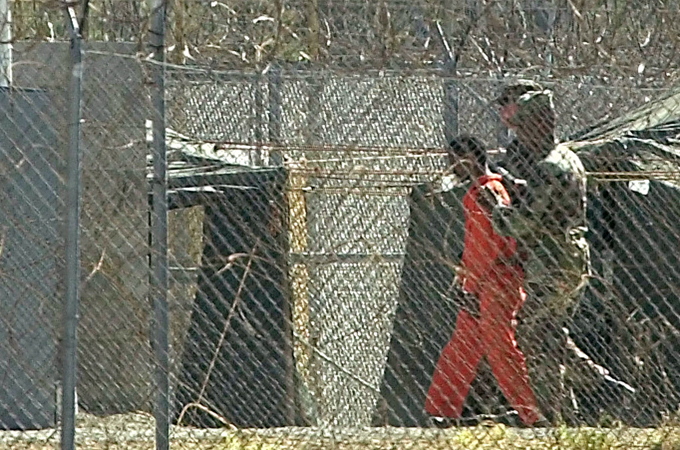During six years behind bars at Guantanamo Bay, Abdul Rauf insisted he was a lowly Taliban foot soldier who delivered bread and tea to combatants, even though he was really a corps commander. He was released in 2007 and sent home to Afghanistan. Until this week, he was working as the top recruiter in Afghanistan for Islamic State radicals.
Rauf, who was killed along with seven others in a U.S. drone strike on Monday, and detainees like him who have returned to the battlefield are complicating President Barack Obama’s hopes of closing the detention center for terror suspects on the U.S. Navy base in Cuba. The administration says the prison is costly, damages America’s relationship with key allies and provides extremists a propaganda tool to woo recruits.
Obama has vowed since he was a presidential candidate to close the detention center, but members of Congress have thwarted that ambition, saying the detainees would return to the fight. They also have argued that governments where the detainees would be released in the region couldn’t be expected to keep track of them and prevent them from becoming active again.
Besides Rauf, one or more of the five Taliban detainees swapped for U.S. Army Sgt. Bowe Bergdahl may have already been in touch with members of the al-Qaida-linked Haqqani network. Qatari officials promised to monitor the five former Taliban officials’ activities and keep them from traveling outside Qatar for a year. That year ends May 31 and lawmakers are wondering what will happen to them.
White House spokesman Josh Earnest has said the five are still in Qatar, but he says efforts to keep them from working with terror organizations “have been updated” to reflect concerns about their contacts. Qatari Foreign Minister Khalid bin Mohammed al-Attiyah said at an event in Washington last week that the five continue to be closely monitored.
Those reassurances have not satisfied Republican lawmakers, especially in light of confirmation Tuesday of Rauf’s death.
“The fact that Abdul Rauf, a former Guantanamo detainee, was acting as a recruiter for IS in Afghanistan underscores the danger of releasing detainees without sufficient assurances that they won’t re-engage in terrorism,” said Republican Sen. Kelly Ayotte.
Pentagon spokesman Navy Rear Adm. John Kirby said Rauf’s death by an American drone shows that detainees “return to the battlefield and to the fight at their own peril.”
Rauf was released into the custody of the Afghan government in December 2007. After spending time in an Afghan prison, he was freed in 2009 and later rejoined the Taliban.
Another complication is the security situation in Yemen. Some detainees who won release were sent to Yemen, but the friendly government there was overthrown last week by Iran-backed Shiite rebels, meaning detainees could not be sent there any time soon. On Tuesday the U.S. closed its embassy in Yemen, which also is home to al-Qaida in the Arabian Peninsula.
Ayotte and three other Republican senators have introduced legislation that the Obama administration says will effectively ban most transfers from Guantanamo for Obama’s remaining two years in office.
Brian McKeon, principal deputy undersecretary of defense for policy, told Congress last week that scores of military leaders have called for Guantanamo’s closure. He defended the procedures used to review detainees who have been transferred back to their homelands or third countries, saying that each transfer is subject to the unanimous agreement of six officials – the secretaries of defense, state and homeland security, the director of national intelligence, the attorney general and the chairman of the Joint Chiefs of Staff.
“Of the detainees transferred during this administration, over 90 percent are neither confirmed nor suspected of having re-engaged,” McKeon said.
When Obama took office in 2009, there were 242 detainees at Guantanamo Bay – down from a high of nearly 800. Fifty-four of the 122 detainees still being held are eligible for transfer to other countries. SAPA






 WhatsApp us
WhatsApp us 

